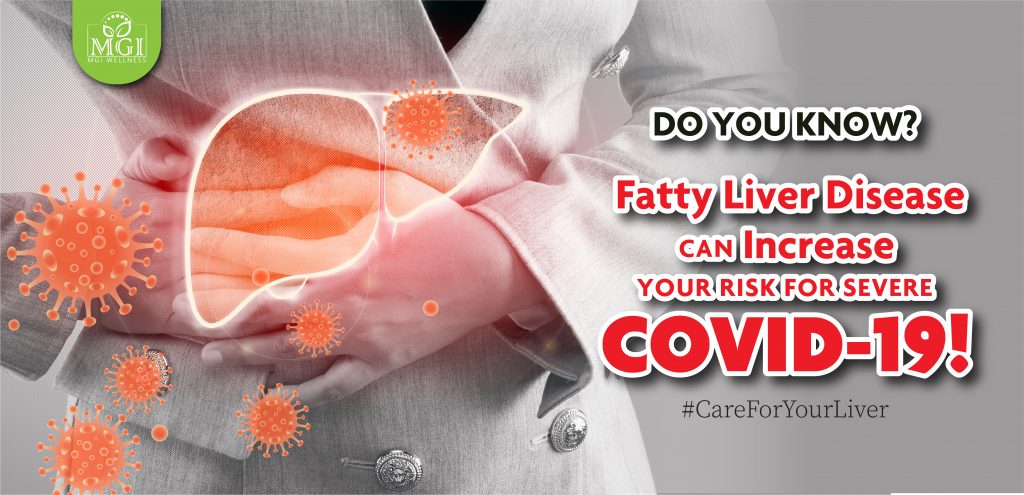Wellness
Do You Know? Fatty Liver Disease Can Increase Your Risk For Severe COVID-19!
The liver is the largest and most important organ in the body. Our liver is working hard for 24/7 as it performs over 500 vital functions including digestion, metabolism, detoxification, immunity, protein synthesis and the storage of nutrients within the body to keep us healthy and alive.
What is Fatty Liver Disease?
Fatty liver disease is a common condition caused by having too much fat build up in your liver. It is normal to have a tiny amount of fat in liver cells, but liver is considered fatty if more than 5-10% of it is fat. Untreated fatty liver will cause cirrhosis of the liver while untreated cirrhosis will leads to liver failure or liver cancer.
There are two main types of fatty liver disease:
- Alcoholic fatty liver disease (ALFD): Due to heavy alcohol use.
- Nonalcoholic fatty liver disease (NAFLD): Occurs when fat builds up in the liver due to eating a high-fat, high sugar diet or obesity.
Unfortunately, fatty liver can be a silent disease and often goes undetected leaving many people unaware they are high risk. According to the Malaysian Liver Foundation, approximately 60% of adults in Malaysia suffer from fatty liver and they may not even realize their liver is struggling because they don’t experience any symptoms.
Risks Factors in Fatty Liver
The known and common risk factors of fatty liver disease are:
- Overweight or obesity
- High alcohol intake
- High-fat diet, especially in saturated fats
- Diabetes
- Having metabolic syndrome (large waist size, insulin resistance, high blood pressure, high cholesterol and high triglyceride levels).
- Lack of exercise
Relation of Fatty Liver disease and Covid-19
Latest research found out that people with fatty liver disease are more than twice as likely to become seriously ill with COVID-19.(1) It means those who are having liver disease such as alcohol-related liver disease, nonalcoholic fatty liver disease, and especially cirrhosis, or scarring of the liver, can make them more likely to get severely ill from COVID-19.
In another study, carried out by teams from UK BioBank and a diagnostic imaging company called Perspectum, involved looking at more than 42,000 liver scans. Data collected has indicated that one in nine people have more than 10% of fat in their liver, have an increased risk of being admitted to hospital with severe COVID-19 complications.(2)
Apart from that, the Centers for Disease Control and Prevention (CDC) already lists liver disease as one of the conditions that may increase a person’s risk for severe COVID-19.
How to Prevent/ Getting Rid of Fatty Liver Disease?
Currently, there is no medication specifically for fatty liver disease. Lifestyle changes are the first-line treatment and prevention for fatty liver disease. Fortunately, the liver has an amazing ability to repair itself. If you making lifestyle changes like avoid alcohol or lose weight, it is possible to reduce liver fat and inflammation and reverse early liver damage. Let’s see some of the diet and lifestyle tips below that can prevent or reverse fatty liver disease.
-
Weight Loss
Research suggests that losing weight is one of the best ways to control or reverse fatty liver if you are overweight or obese. According to The National Health and Morbidity Survey 2019, one in two adults in Malaysia are either overweight or obese. Fatty liver rate has been estimated to be about 30%. Aim for a healthy weight falls within BMI of 18.5 to 24.9 kg/m².
A good goal is to lose 10% of your total body weight, but even a loss of 3% to 5% can improve your liver health by lowering inflammation and the odds of injury to your liver cells. In a three-month study of overweight adults, reducing calorie intake by 500 calories per day led to an 8% loss of body weight, on average, and a significant decrease in fatty liver score.(3)
Meanwhile, a study in the JAMA Internal Medicine found that people who lost just 3% to 6% of their body weight reduced their liver fat levels by 35% to 40%.(4)
-
Maintain a Well-Balanced and Healthy Diet
Having to choose healthy food does not mean you need to give up on your favorites. A diet for fatty liver disease should include a wide variety of foods. Eating high fiber and natural foods is a good starting point. Choose foods contain complex carbohydrate (e.g. brown rice, wholegrain bread,oats) , fiber, and protein can provide sustained energy and promote satiety.
Try to cut down on refined carbohydrates like white rice, white bread, sweet desserts and soft drink. In one study, obese adults who consumed a diet high in calories and refined carbs for 3 weeks had a 27% increase in liver fat, on average, even though their weight only increased by 2%.(5)
You can always think of a way to turn your favorites into a healthy option. For example:
- Bake or air fry your foods instead of deep fry to take off the extra oil.
- Use low-fat yogurt instead of mayonnaise.
- Steam your vegetables rather than boiling them to avoid loss of nutrients.
- Remove all visible fat from food before you cook it, take the skin off chicken and trim the white fat off any meat.
- Keep a supply of healthy snacks to hand like fresh-cut fruits, unsalted baked nuts and seeds, greek yogurt or baked vegetables chips.
- Limit the number of times you eat out to once a week. Prepare and take your own packed lunch to work.
-
Exercise Regularly
Regular and moderate physical activity leads to a healthy body weight and can be an effective way to decrease liver fat. Aim for 150 minutes of activity weekly, or 30 minutes five times a week.
Scientific data showed that performing a combination of aerobic exercise (brisk walking, jogging, hiking, cycling) and resistance training (pushup, chin-up, sit-up, body squat) appear to diminish the amount of fat stored in liver cells.(6) In a 4-week study, obese individuals who trained for 30-60 minutes, five days per week, saw an impressive 10% loss in liver fat, even though their weight remained unchanged.(7)
Since working out regularly is important for reducing liver fat, choosing something you enjoy and can stick with is your best strategy.
-
Avoid or Limit Alcohol
When you drink alcohol, your liver has to process and remove it from your body; which is not easy. The process of breaking alcohol down can generate harmful substances that can damage liver cells, promote inflammation, and weaken your body’s natural defenses. The more alcohol that you drink, the more you damage your liver.
If you have fatty liver disease , you should not drink at all as it can lead to more serious liver damage. On the other hand, for those who want to prevent from fatty liver disease should try to limit your alcohol use to the recommendations where the intake of alcohol should be limited to no more than 1 standard drink per day for women and no more than 2 standard drinks per day for men. A “drink” being equivalent to 150ml wine (12% alcohol), 285ml beer (5% alcohol), or 30ml of spirits (40% alcohol).
-
Supplements/ Herbs That May Improve Fatty Liver
Results from several studies suggest that certain herbs, vitamins and supplements may help reduce liver fat and decrease the risk of liver disease progression.
Silymarin from milk thistle seed is one of the best-researched herbal supplements that focused on promotes normal liver cells regeneration and supports the detoxification process. In a 90-day study of people with fatty liver, the group who took a silymarin (milk thistle extract 250-376mg per day) supplement and followed a low-calorie diet experienced twice the reduction in liver size as the group who followed the diet without taking the supplement.(8)
Turmeric is another natural herb supported by research that could prevent or treat non-alcoholic fatty liver disease. Curcumin in turmeric possesses powerful antioxidant and anti-inflammation effects, It also lowers levels of liver enzyme (marker of liver damage) alaine aminotransferase (ALT) and aspartate aminotransferase (AST).
In a study that included 60 adults with elevated ALT levels, the participants were randomly assigned to take 3 grams of turmeric powder, 3 times daily or placebo for 12 weeks. Compared to the control group, the turmeric group had significantly lower levels of ALT (−26.5% vs. -3.4%) and AST (−23.1% vs. -2.2%).(9)
References:
- Targher G, Mantovani A, Byrne CD, et al. Risk of severe illness from COVID-19 in patients with metabolic dysfunction-associated fatty liver disease and increased fibrosis scores. Gut 2020;69:1545-1547.
- A Roca-Fernández et al. High liver fat associates with higher risk of developing symptomatic COVID-19 infection. medRxiv 2020.06.04.20122457
- Scaglioni Fet al. Short-term multidisciplinary non-pharmacological intervention is effective in reducing liver fat content assessed non-invasively in patients with nonalcoholic fatty liver disease (NAFLD). Clin Res Hepatol Gastroenterol. 2013 Sep;37(4):353-8.
- Dimitrios A. Koutoukidis et al. Association of Weight Loss Interventions With Changes in Biomarkers of Nonalcoholic Fatty Liver Disease. JAMA Intern Med. 2019 Sep; 179(9): 1262–1271.
- Sevastianova Ket al. Effect of short-term carbohydrate overfeeding and long-term weight loss on liver fat in overweight humans. Am J Clin Nutr. 2012 Oct;96(4):727-34.
- Van der Windt. D.J.al. The Effects of Physical Exercise on Fatty Liver Disease. Gene expression. ;18(2), 89–101.
- et al. Endurance Exercise Reduces Hepatic Fat Content and Serum Fibroblast Growth Factor 21 Levels in Elderly Men. The Journal of Clinical Endocrinology & Metabolism. 2016 ;101(1), 91-198.
- Sorrentino Get al. Efficacy of lifestyle changes in subjects with non-alcoholic liver steatosis and metabolic syndrome may be improved with an antioxidant nutraceutical: a controlled clinical study. Drugs R D. 2015 Mar;15(1):21-5.
- Sang-Wook Kim et al. The effectiveness of fermented turmeric powder in subjects with elevated alanine transaminase levels: a randomised controlled study. BMC Complement Altern Med. 2013; 13: 58.


Wow, great article.Thanks Again. Really Cool.
hello there and thank you for your information – I have certainly picked up something new from right here. I did however expertise a few technical issues using this website, as I experienced to reload the web site a lot of times previous to I could get it to load properly. I had been wondering if your web host is OK? Not that I’m complaining, but sluggish loading instances times will often affect your placement in google and could damage your quality score if ads and marketing with Adwords. Well I’m adding this RSS to my e-mail and can look out for a lot more of your respective interesting content. Ensure that you update this again soon..